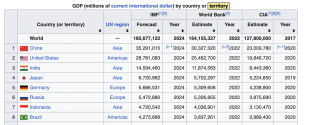So you basically measure economic power by the capability to run a money printing press. Interesting.
If you can simply run the printing press, than other countries currency should ideally increase in value. But not the case.
He's Indian and I said some mean things about Indians. Let's just let him vent for a bit
Don't spread rumors.
It's unimaginable to you? You have a very poor imagination; it's rare when someone's imagination is less creative than reality as the RMB constantly flunctuates against the USD and it's currently unremarkable. Nominal GDP is determind by currency conversion, which is determined by the central bank. In other words, the size of your nominal GDP is determined by you. And yet, people don't try to one-up each other; why? Because it's pointless; nominal GDP just a trade tool to regulate import and export rate. You can raise your currency sky high and boost your nominal GDP through the roof and you wouldn't increase the size of your economy, only bust your own exports while heralding in imports. Why has the US complained to China before that it's undervaluing the RMB? Cus the US wants China to have a larger economy? LOL Why did you post this terribly ignorant thing on this forum?
The nominal increase in US GDP to such an extent was. Yes RMB will fluctuate, but the nominal growth rate in China has come down in RMB terms as well. The growth rate of 5.3% is real, since there is deflation, the nominal growth is lower than that.
Nominal GDP is not pointless, it is not just a countries wish that they can value the currency as whatever they like. It is also a metric by which value of products and services and labor is compared across economies. They are pros and cons of devaluation. If you are driving major devaluation, usually this would imply rise in inflation, rise in exports (though not necessarily), and an undervaluation of the labor in the country.
That China's economy faced immense challenges is something acknowledged by pretty much everyone including the government, which is the reason that major corrective actions have been put in place this year. This is not even disputable.
There are positives though. Positives:
- Property Bubble has been deflated, major positive.
- Auto Industry is doing well both in growth and tech advancement, and as per recent reports overtook property, another major positive.
- Overall, economy is starting to look up.
In other news, this year trade has returned to positive trajectory.

